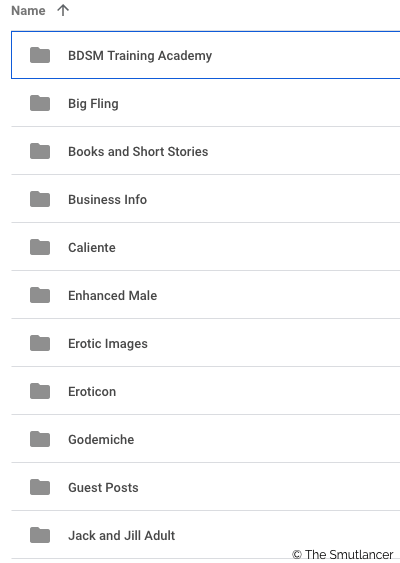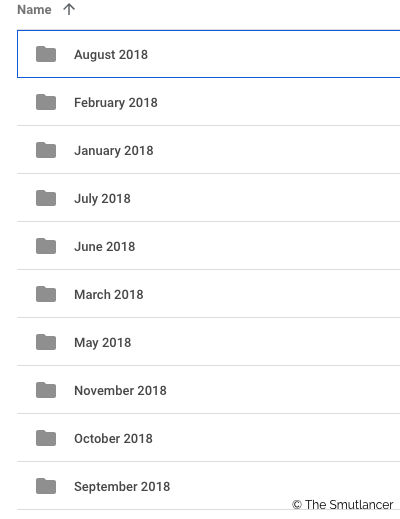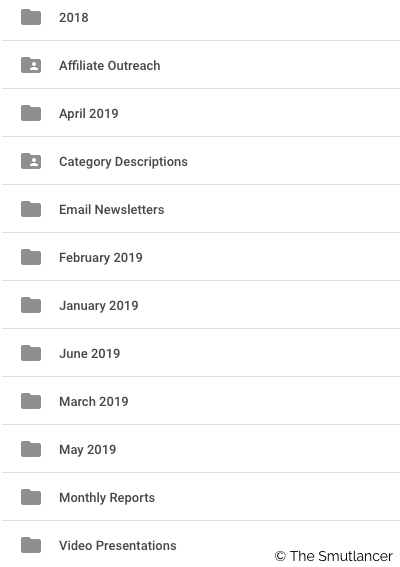4 Tools I Use to Stay Organized as a Smutlancer
I use as many organizational tools as I can to be productive. Today, I’m sharing the four main tools I use and how I use them to keep my work and files organized. They’re all quite common — you probably use them to. These are simply my methods.
As always, feel free to try what speaks to you and ignore the rest.
File Storage
I use two main file storage options: Google Drive and an external hard drive (My Passport 1TB — affiliate link). For temporary file saving, I use the hard drive on my Macbook, but it’s not made for lots of storage. I also use my email, but that can become unwieldy very quickly. More on email organization in a bit.
If you’ve got privacy concerns over Google, I respect that. I recognize the issues and choose to use it anyway. It’s easy and works with everything I have. Plus, I’m a creature of habit, and I’ve used Google Drive for so long now I can’t imagine having to switch.
For large files — audio and visual — I use my external hard drive. Old files that I’ll never use again get archived here, too — typically former clients I no longer work with or old, defunct projects.
File Organization
My file organization is similar both in Google Drive and in my external drive. Not for any other reason than that’s how my brain works best.
Here’s my process:
- Each client or project gets a folder in Google Drive
- Within each client folder, I create a folder for the current month and year. This is where each month’s work is filed.
- At the end of the year, I file all the months of work for a single client or project into a folder for the year.
- Within each folder, files are named by the title of the piece I worked on. This makes searching by key words a little easier to find — though not always.
- I may also create other folders within the client folder for special projects or ongoing tasks that are separate from the content I create.
- Miscellaneous documents for that client or project will sit in the main folder until I figure out a common folder they belong in. Some never move from the main folder.
This system transfers to my external hard drive because I’m often downloading Google folders directly to it, so that’s the format they’re already in.

Screenshot of file folders in Google Drive

Screenshot of monthly calendars in Google Drive

Screenshot of client folder in Google Drive — with monthly folders and miscellaneous folders
To-Do Lists and Scheduled Work
My preferred method of keeping up with both current, past, and future work is a spreadsheet. Get it here: 3 Downloadable Tools to Track Your Smutlancer Income. Each year I make a new spreadsheet with the same format (barring any changes I make as I become more organized).
Each month, I list all the work I’m contracted to complete during the month. I update it at the first of each month with work that’s already commissioned, and then I update it as new projects come in.
I record completed work using the same title as the file name. This makes it easier to accurately invoice clients for the work I do. I don’t send out invoices until the end of the month so I refer back to my spreadsheet for an accurate listing of everything I completed.
This spreadsheet also acts as a cross reference of what work I’ve done in the past. I may remember writing a piece in a certain month but not the client. Or I may remember working for a brand in a given month but don’t remember the piece I wrote. Since I live in this spreadsheet every day, searching here is quicker than searching my files.

Screenshot of spreadsheet to do list with content title, completed date, word count, and more
Email Organization
The way I organize my email is similar to Google Drive. Every client, brand, or project gets their own folder. All emails from or about that topic are filed there.
I have two bad habits when it comes to emails:
- I don’t file away emails in my inbox as often as I’d like. Making it a nightmare to find anything. I strive for weekly, but monthly is more typical.
- I don’t get rid of filed emails…EVER. Yes, I delete spam and trash, but if it lives in a folder in my inbox, it may never get deleted. After all these years, I probably have millions of emails. And I’ll never look at them again.
Why do I take my email organization as seriously as file organization? Because I want the record of a conversation.
I’ve used past emails to remind myself of work I’ve done and as proof of what was said. This is great for making a good impression with returning clients. I’ll look at old emails and be reminded of what we did in the past — they think I’m a genius who remembers everything. (Nope, just a digital hoarder.)
But I also use those emails to not be bullied into agreeing to something else or being cheated out of the negotiated price. It’s rare, but being able to put my hands on old emails has helped me enough that I’ll keep filing them and keeping them.

Screenshot of email inbox folders
Finding a System that Works for You
I use plenty of other tools, but these are the biggest. Without them, I’d be lost. With them, I don’t have to remember everything. This system saves me time and helps me get as much done as possible.
You don’t have to use my organization system for your smutlancer work. But I highly recommend that you find whatever works best for you. When you do, you’ll save yourself time — which means you can take on more work or have more time to relax. Either way, the right organizational system benefits YOU.
Okay, over to you. What systems and tools do you use to stay organized?

Ah, this reminds me I still need to get my stuff organized! Thanks for the reminder and thanks for sharing!
Rebel xox
LOL, you’re welcome! Happy to provide a push whenever necessary. 🙂